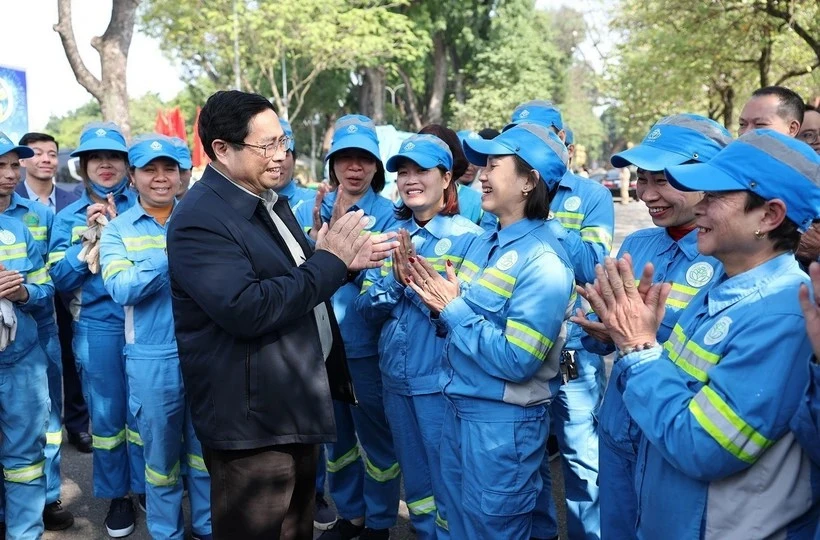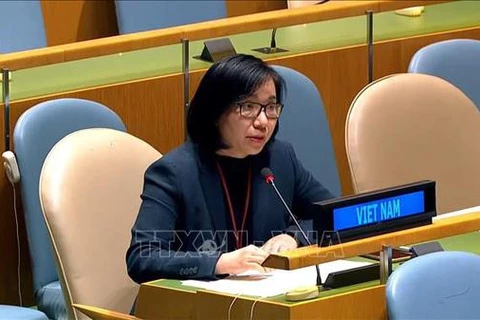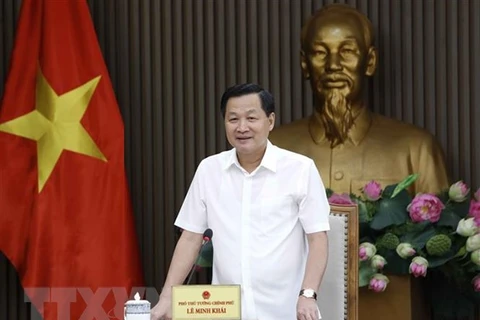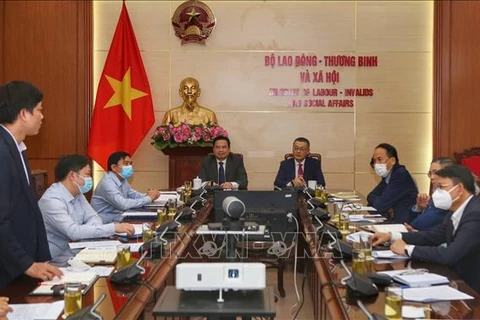
Hanoi (VNA) – At the recent US Department of Commerce (DOC)’s hearing on the recognition of Vietnam's market economy status on May 8, Vietnamese representatives presented arguments, information, and data affirming that the Vietnamese economy completely meets the criteria and is doing even better than many economies that have gained the status.
Former US Ambassador to Vietnam Ted Osius, who is now head of the US-ASEAN Business Council, underlined that Vietnam is already a market economy.
"It has met key criteria such as currency convertibility and is ready for an accurate designation," Osius was quoted by Reuters as saing, adding that American businesses are already investing significantly in Vietnam as they recognise its growth potential.
However, with a hostile attitude and lack of good will, the Human Rights Watch (HRW) immediately issued a statement that the Vietnamese government is giving false or misleading information to the US and other economic partners in order to obtain or maintain preferential trade regulations. Along with that, it provided false analyses and assessments about workers' rights.
Reality shows that for many years, with a lack of goodwill, the HRW has not missed any "opportunities", from political and diplomatic events to economic-political or judicial activities, to attack, distort, pressure, and lower Vietnam's reputation in the international arena.
At a press conference on May 9, Foreign Ministry spokesperson Pham Thu Hang said that Vietnam welcomes the US to hold the hearing.
She underlined that so far, 72 countries have recognised Vietnam as a market economy, including such large economies as the UK, Canada, Australia, and Japan. Vietnam has also participated in 16 bilateral and multilateral free trade agreements with more than 60 partners across the world, she noted.
This partly shows that Vietnam's efforts in building a dynamic and effective market economy have been recognised by the international community, and are an important basis for the country’s cooperation relations to become deeper and deeper. Therefore, HRW's arguments, which deliberately deny the market economy in Vietnam and provide information that does not reflect the truth about the rights of Vietnamese workers, are biased and extreme, and cannot be accepted.

In Vietnam, working and employment are among the basic rights of citizens which have received special attention from the Party and State, and been concretised in legal documents and implemented in real life.
Article 35 of the 2013 Constitution clarifies that citizens have the right to work and to choose their occupations, employment and workplaces. Employees are guaranteed equal and safe working conditions; and have the right to wages and rest periods. Discriminatory treatment, forced labour or the employment of people below the minimum working age is prohibited.
On the basis of the Constitution, the 2019 Labour Code affirms in Clause 1 of Article 4 on State policies on labour to ensure the lawful and legitimate rights and interests of workers and of persons working without an employment relationship and to encourage agreements that provide conditions for workers that are more favourable than those provided in labour law.
It defines the rights and obligations of labourers, including the rights to receive a wage commensurate with their occupational qualifications and skills on the basis of an agreement reached with the employers, to be provided with labour protection and work in a safe and healthy environment, and to take entitled leave and paid annual leave and receive collective welfare benefits.
Labourers have the right to establish, join and participate in the activities of workers’ representative organisations, occupational associations and other organisations in accordance with the law; to request and participate in dialogues ; to implement regulations on democracy; to engage in collective bargaining with the employer and to be consulted at the workplace in order to protect their lawful and legitimate rights and interests; and to participate in management in accordance with the employer’s regulations, according to the law.
The 13th National Congress of the Vietnam General Confederation of Labour (VGCL) for the 2023-2028 tenure, which took place in December 2023, highlighted that amid more difficulties and challenges than forecast, trade union activities have continued to see important improvements, affirming important role of trade unions in representing, caring for and protecting the legitimate and legal rights of members and labourers.

The role of trade unions in participating in building harmonious, stable and progressive labour relations in enterprises has also continued to be affirmed. Particularly, during COVID-19 outbreak when many labourers were affected, trade unions at all level showed their active role in preventing and combat the pandemic and implementing support packages for affected labourers at the same time, while presenting savings books to union members’ children orphaned by the pandemic with a total of nearly 6 trillion VND (235.98 million USD).
The congress set targets for the whole tenure, including expanding its membership to 15 million, establishing grassroots trade unions in 100% of the enterprises having 25 labourers and above, ensuring that at least 83% of the enterprises and units have qualified trade unions according to the law, and striving to have 90% or more of labour lawsuits supported by trade unions when requested by members.
One of the breakthroughs in the new tenure defined at the congress is to promote dialogue and collective bargaining, focusing on wages, bonuses, working hours, rest hours, and occupational safety and hygiene.
Since Vietnam re-joined the International Labour Organisation (ILO) in 1992, the country has always shown efforts and commitments to implementing international conventions in general and conventions on labour relations in particular, thus promoting and ensuring basic labour standards for workers in Vietnam in accordance with international standards on workers' rights.
Specifically, Vietnam has joined 25 ILO conventions. In 2019 alone, it ratified three conventions, including Convention 88 on employment service, Convention 159 on vocational rehabilitation and employment for disabled persons, and Convention 98 on the right to organise and collective bargaining. The important contents of the ILO's fundamental conventions have been reflected in regulations of the Labor Code.
With the proper orientations and policies of the Party and State and the efforts of trade unions, over the years, the rights of Vietnamese labourers have been ensured. This is an important foundation facilitating the country’s international integration and engagement in new-generation free trade agreements, contributing to promoting the development of a market economy. This vivid reality is the most important basis to refute arguments that distort and misrepresent labour-related issues in Vietnam./.






















